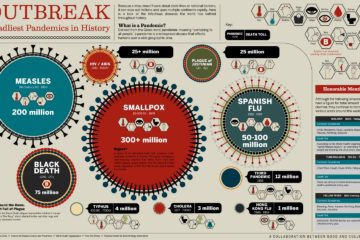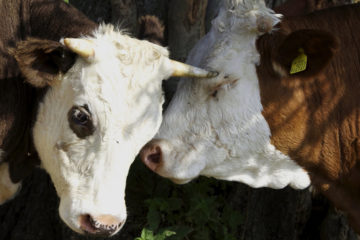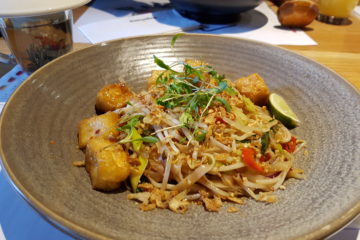I wrote to my friends asking why Jains and Vegans do not eat eggs. I’ve never really been sure about it. If it is on the basis of not killing a creature that is alive; then I was told that as long as the egg’s not been fertilised, it’s not a life yet and hens lay eggs anyway. Thus it is OK to eat them! Someone else told me it was OK as long as you didn’t see a red dot in them as that represents blood. If you see a black dot it’s what would have been the eye so it’s not OK either. Not being satisfied with these explanations I’ve asked again. The answers I got are below: –
Mahersh wrote: –
….basically this is to do with the inherent cruelty associated with the industrial egg production system, whether battery, barn, free range etc.
Fundamentally, I guess that every time human beings exploit animals by forcing them to live like machines in an environment that is optimised for some sort of production (i.e. egg production in this case), there is inevitably going to be cruelty and slaughtering involved. So as we don’t need eggs to live, why not free ourselves from all this unnecessary cruelty by avoiding eggs altogether?
Specifically, as regards the cruelty of egg-production, it may generally be well-known that the battery system is cruel because of the cramped environment that the hens are forced to live in all their life (e.g. each hen is forced to live her life in a space the size of a sheet of A4 paper). These hens are also “debeaked” (a mutilation process known to cause pain) to prevent them from pecking one another (since living in cramped conditions day in day out naturally leads to stress, aggression, cannibalism, etc. or the hens can accidentally peck one another since they have virtually no space between them).
However, even the other “higher welfare” system (e.g. barn eggs and free-range eggs) are cruel for various reasons. One thing that we cannot get away with in all these egg-production systems is that they involve slaughtering at two stages: (a) during breeding, and (b) when the egg-laying hen’s production level falls (at about 72 weeks old).
Regarding the breeding of the egg-laying hens (to produce more eggs), for every female chick that is born like this, there is always going to be a male chick too. What happens to the male chicks? They are killed by being gassed.
All the above indicate to me that there is considerable himsa (violence) associated with commercially-produced eggs, and therefore eating eggs is not Jain and not vegan.
I believe that in Jainism, even if it were possible to obtain ahimsa eggs (e.g. from a hen living happily and freely at a sanctuary and if she’s laid an egg that she chooses to abandon rather than mother), even in that case, that egg would be forbidden to be consumed if following a strict Jain diet. I’ll leave it to someone else to explain why that is the case.
Finally, for more detailed factual information on the cruelty associated with egg production, please visit:
http://www.vegansociety.com/html/animals/exploitation/hens.php
http://www.animalaid.org.uk/h/n/CAMPAIGNS/factory/ALL/578/
http://www.viva.org.uk/pdfs/egg_factsheet.pdf
Sagar wrote: –
Essentially, egg laying hens are only useful [to an egg selling company] so long as their productivity of egg production is high. However, once they have passed their peak of egg production (after around 72 weeks), it is no longer economically viable to keep them for egg production (as the cost of feeding them, cleaning them etc, outweights the value gained from their egg production). These hens are sold on and sent to the slaughterhouse for prices as low as 2p and used for as things such as chicken soups, pasties etc.
By consuming eggs, one inevitably subsidises the meat industry by subsidising the cost of rearing chickens in such a way, and allowing them to be sold for such a low price for use in meat. [I imagine that chicken bred for normal meat consumption will fetch much higher price]
This means that even forest eggs, which apparently have better welfare standards than free range eggs, are not free from cruelty.
The same argument applies to leather and milk. My grandma (who, incidentally doesn’t wear leather herself) often tells me that in India, it is generally fine to wear leather because you are simply taking the skin off an animal that is already dead. Unfortunately this is not reality.
So long as the animal has been reared / killed for meat production (as is normally the case), the money paid for the leather subsidises the cost of meat production and thus subsidises the meat industry (you can see this using a simple model below).
Imagine it costs a farmer £5 to rear a cow. Imagine that the beef produced from the cow is worth £4, and that the leather is worth £2. If only the beef can be sold, then the farmer will make a £1 loss by selling the cow, and thus (s)he will choose not to rear the cow (assuming he can choose whether or not to force production – for example (s)he may not artifically inseminate the cow to force production).
If the farmer knows that the leather will be bought by a vegetarian who thinks that it is ok to purchase leather because the cow is ‘already dead’, the farmer knows (s)he will now receive £6 revenue from the cows body parts, and knowing this the farmer will choose to rear the extra cow. Thus the vegetarian may actually be supporting the production of meat without consuming it himself.
The unfortunate truth is that this line of thinking can be extended to a lot of things. By purchasing food items from many restaurants, as vegetarians and vegans we invetably end up subsidising meat production in one way or another.
For example, when I eat in canteens at University, the same price is charged for both vegetarian / vegan and non-vegetarian dishes. In general, non-vegetarian dishes cost more to produce than vegetarian dishes (especially when organic etc). Thus by eating at these places, I inadvertently end up supporting the meat industry.
The more I think about it, the harder it becomes to avoid supporting the meat / non vegan industries in anyway.
I guess the key is to think and find out as much as possible about what you purchase and think about alternatives which may be better aligned with your personal beliefs.
Sagar

A debeaked chicken

A chicken being debeaked






7 Comments
Alpa Shah · September 20, 2008 at 3:55 pm
If you have made choice to abstain from eating eggs you need to know the following: –
Something to keep in mind when you go to an ‘Indian’ vegan place
Having visited a very good restaurant in Suburban Mumbai we ordered Jain Subzi along with combination of NAN & Roti. In a few seconds the managers of the restaurant who was known to me from many years approached me and requested me to cut NAN from our order as it was not sa JAIN food, i inquired to him that how was that possible as it’s only made of MAIDA.
What he clarified with his professional ethics was just shocking, here are the details :-
1] NAN, KULCHA & RUMALI ROTI CANNOT BE MADE WITHOUT EGG in it.
It is absolutely impossible for any one to make them without egg in a hotel. It will not be that soft and elastic through out the day and shall start to
crack in some time.
2] He also clarified that as been registered a Vegetarian Hotel he can’t bring in eggs so the get the Atta made in ready form from local bakeries who prepare it for them and supply to all restaurants.
3] He also said that even thought all restaurants owners shall deny this but it is a fact and that others do not say it so as to not loose business. In fact they turn a blind eye on what the bakery staff add to the atta mixture.
4] He also stated that he been experience for soo many years in as a restaurant manager in many hotels does not know any single outlet that could give you VEGETARIAN NAN, KULCHA or RUMALI ROTI.
5] He also stated that he now clarifies it to all his clients as he feels that it is against his ethic’s to not provide details to the customer.
6] Only Plain Roti is the only item that a normal Vegetarian or a Jain can consume in a hotel.
All this stated above is 100% true and I request you to pass it on to your vegetarian and/or Jain friends.
Heena Modi · September 20, 2008 at 4:01 pm
I had no idea.
Thanks Alpa.
Something to keep in mind 🙂
Heena 🙂
Gary · November 30, 2008 at 5:40 pm
The debate….
Is it about rights theory or welfare theory?
Neither! It’s about one basic issue: can we morally justify inflicting suffering and death on other sentient beings? If the answer to that is “no,” then we need to propose a solution.
We live in a world in which we kill 53 billion animals a year for food (not counting fish and other water animals). That is not going to end any time soon. So the question becomes: what to do now?
Some people say that we should propose incremental steps to end animal suffering, such as larger cages, more ‘humane’ slaughter methods, etc. Indeed, almost all of the large animal organizations propose this solution.
I maintain that this is not the way to go.
First of all, if we cannot justify torturing and killing nonhumans, then to propose ‘humane’ torture and killing as the answer is morally problematic. What would we say of a child advocate who proposed ‘humane’ pedophilia; a women’s advocate who proposed ‘humane’ rape?
Second, animal welfare measures simply do not work. As I have argued for 20 years in my work, animal welfare reforms provide precious little protection for animal interests. For the most part, these reforms actually make animal production more economically efficient.
For example, a producer who gasses chickens using the method that PETA advocates will have an initial capital outlay to purchase the technology, but will actually make greater profit–and significantly so.
Third, animal welfare reforms make the public feel more comfortable about continuing to exploit animals. The news is filled with stories on an almost daily basis of people who are going back to eating animal products because PETA or some other group has proclaimed them to be ‘more humane.’
In the end, we live in a world of limited resources–we all have limited time, money, and energy. We have a choice to make. How shall we spend our time and resources? Today, I have a choice of whether I am going to spend my time encouraging people to go vegan or encouraging them to eat ‘humane’ products. I cannot do both. It is a zero sum game. Every minute I spend on ‘cage free’ eggs is a minute
less than I can spent on ‘NO eggs’!
For me, the answer is easy: I devote a part of each day–sometimes a very large part–to educating people about veganism. Veganism is the only solution consistent with the moral view that we cannot justify imposing suffering and death on animals–however ‘humane’ it may be.
Veganism is the only practical solution as well. It is the only answer that actually reduces demand and, at the same time, creates a base of people who live Ahimsa (non violence) in their life everyday.
In short, the vegan/abolitionist approach that I advocate is not merely theoretically consistent with view that we cannot justify inflicting suffering and death on sentient animals, it is pragmatic as well. If there is anything that is not pragmatic, it is the approach urged by PETA and other groups: that making torture ‘better’ will make
torture go away. That is folly; it is a strategy that will only further enmesh violence and make it more acceptable.
Gary
A Guide to Eating a Plant-Based Diet | 禅3 · September 27, 2012 at 7:19 pm
[…] called a “lacto-ovo” vegetarian. You can then eliminate eggs — and no, they’re not cruelty-free. This is one of the easier stages, in my […]
A guide to eating a plant based diet | barre body · September 28, 2012 at 5:12 am
[…] and dairy, that’s called a “lacto-ovo†vegetarian. You can then eliminate eggs — and no, they’re not cruelty-free. This is one of the easier stages, in my […]
A Guide to Eating a Plant-Based Diet | Video Marketing Talk · September 30, 2012 at 6:19 am
[…] called a “lacto-ovo” vegetarian. You can then eliminate eggs — and no, they’re not cruelty-free. This is one of the easier stages, in my […]
A Guide to Eating a Plant-Based Diet (RE-BLOG) « [dawn mauricio] · October 17, 2012 at 6:23 pm
[…] and dairy, that’s called a “lacto-ovo†vegetarian. You can then eliminate eggs — and no, they’re not cruelty-free. This is one of the easier stages, in my […]
Comments are closed.